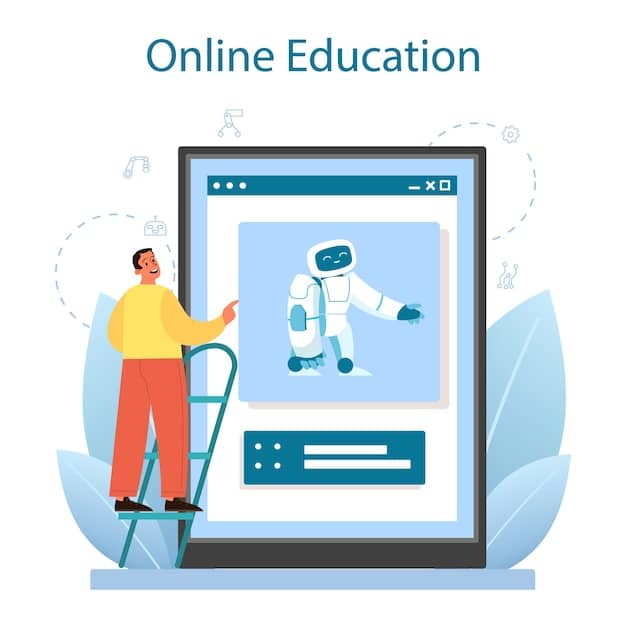The Impact of AI on Education: Expert Predictions for the Next 5 Years

The Impact of AI on Education: Expert Predictions for the Next 5 Years reveals transformative changes, including personalized learning, AI-driven tutoring systems, and automated administrative tasks, all poised to enhance teaching methodologies and student outcomes while addressing challenges like data privacy and equitable access.
The integration of Artificial Intelligence (AI) into education is no longer a futuristic concept but a rapidly unfolding reality. The impact of AI on education: expert predictions for the next 5 years suggests a transformative shift in how we teach, learn, and administer educational institutions.
The Rise of Personalized Learning
Personalized learning, once a distant aspiration, is becoming increasingly feasible with the advancements in AI. By analyzing data on students’ learning styles, paces, and preferences, AI can tailor educational content to meet individual needs.
This shift promises to create more engaging and effective learning experiences, ensuring that each student receives the support and challenges they need to thrive.
Adaptive Learning Platforms
Adaptive learning platforms are at the forefront of this personalized revolution. These platforms use AI algorithms to adjust the difficulty and content based on a student’s performance, providing a customized learning path.
As AI continues to evolve, these platforms will become even more sophisticated, offering more nuanced and effective personalization.
AI-Driven Content Creation
AI is also empowering educators to create personalized content more efficiently. Tools that automate the creation of quizzes, worksheets, and lesson plans are becoming increasingly common.
This allows teachers to focus on what they do best: mentoring, guiding, and inspiring their students. Here are some applications:
- Creating customized lesson plans based on student data.
- Generating adaptive quizzes that adjust in difficulty.
- Providing personalized feedback on student assignments.

AI-Powered Tutoring Systems
One of the most promising applications of AI in education is the development of intelligent tutoring systems. These systems provide students with personalized guidance and support, acting as virtual tutors that are available 24/7.
As AI algorithms improve, these tutoring systems are becoming increasingly effective, offering targeted assistance and feedback.
Real-Time Feedback and Support
AI-powered tutoring systems can provide real-time feedback on student performance, identifying areas where they are struggling and offering targeted support. This immediate feedback helps students correct their mistakes and reinforce their understanding.
Moreover, these systems can adapt to a student’s learning style, providing explanations and examples that resonate with their individual preferences.
Accessibility and Affordability
Another significant advantage of AI tutoring systems is their accessibility and affordability. Unlike traditional tutoring, which can be expensive and difficult to access, AI tutors are available to anyone with an internet connection.
This can help bridge the achievement gap and provide all students with the opportunity to succeed and can assist with:
- Providing 24/7 access to personalized tutoring.
- Offering immediate feedback on assignments and quizzes.
- Adapting to individual learning styles and preferences.
Automating Administrative Tasks
AI’s capabilities extend beyond the classroom, offering significant potential to streamline administrative tasks. By automating routine processes, AI can free up educators and administrators to focus on more strategic initiatives.
From grading assignments to managing student records, AI is poised to transform the way educational institutions operate.
Automated Grading and Assessment
Grading assignments is one of the most time-consuming tasks for educators. AI can automate this process, providing accurate and consistent evaluations of student work.
This not only saves teachers time but also ensures that students receive timely feedback on their performance.
Data Management and Analysis
AI can also help educational institutions manage and analyze vast amounts of data. By identifying patterns and trends in student data, AI can provide insights that inform decision-making and improve outcomes.
This can help administrators allocate resources more effectively and develop targeted interventions for struggling students and includes:
- Automating the grading of multiple-choice and short-answer questions.
- Analyzing student data to identify trends and patterns.
- Managing student records and transcripts more efficiently.

Addressing the Challenges and Concerns
While the potential benefits of AI in education are significant, it’s essential to address the challenges and concerns that come with its integration. Issues such as data privacy, algorithmic bias, and the digital divide must be carefully considered.
By proactively addressing these challenges, we can ensure that AI is used in a way that promotes equity and inclusivity.
Data Privacy and Security
One of the biggest concerns surrounding AI in education is the privacy and security of student data. As AI systems collect and analyze vast amounts of personal information, it’s crucial to implement robust safeguards to protect against breaches and misuse.
Educational institutions must comply with privacy regulations and adopt best practices for data security.
Algorithmic Bias and Fairness
Another concern is the potential for algorithmic bias. AI algorithms are trained on data, and if that data reflects existing biases, the algorithms will perpetuate those biases.
It’s crucial to ensure that AI systems are fair and equitable, and that they don’t discriminate against certain groups of students by:
- Implementing strict data privacy and security policies.
- Ensuring that AI algorithms are free from bias.
- Addressing the digital divide by providing equitable access to technology.
The Evolving Role of Teachers
As AI takes on more routine tasks, the role of teachers will evolve. Rather than being the primary source of information, teachers will become facilitators of learning, guiding students through personalized learning experiences.
This shift will require teachers to develop new skills, such as data literacy, instructional design, and personalized coaching.
Focus on Critical Thinking and Creativity
With AI handling more of the rote memorization and basic skills, teachers can focus on fostering critical thinking, creativity, and problem-solving skills.
These are the skills that will be most valued in the future workforce, and teachers are uniquely positioned to cultivate them.
Mentoring and Coaching
Teachers will also play a more important role as mentors and coaches, providing personalized support and guidance to students. This will require strong interpersonal skills and the ability to build meaningful relationships with students.
AI can enhance the teacher’s ability to provide personalized support while:
- Facilitating personalized learning experiences.
- Fostering critical thinking and creativity.
- Providing personalized mentoring and coaching.
Preparing for the Future of Education
The **impact of AI on education: expert predictions for the next 5 years** present numerous opportunities and challenges. Educational institutions, educators, and policymakers must work together to prepare for this new reality.
This includes investing in professional development, developing ethical guidelines, and addressing the digital divide.
Investing in Professional Development
To effectively integrate AI into education, teachers need professional development opportunities to learn about AI tools and best practices. This training should focus on how to use AI to enhance teaching and learning.
It should also address the ethical considerations and challenges that come with AI.
Developing Ethical Guidelines
As AI becomes more prevalent in education, it’s crucial to develop ethical guidelines to ensure that it’s used responsibly. These guidelines should address issues such as data privacy, algorithmic bias, and fairness.
They should also promote transparency and accountability in the use of AI.
| Key Point | Brief Description |
|---|---|
| 🤖 Personalized Learning | AI tailors content to individual needs, enhancing engagement. |
| 🧑🏫 AI Tutoring | Virtual tutors offer 24/7 support and real-time feedback. |
| ⏱️ Admin Automation | AI streamlines grading, data management, and resource allocation. |
| 🛡️ Ethical Considerations | Addressing data privacy, bias, and equitable access. |
FAQ
▼
AI analyzes student data to tailor educational content, adjusting difficulty levels and providing customized learning paths based on individual needs and preferences.
▼
AI tutoring systems offer 24/7 access to personalized support, real-time feedback, and adapt to individual learning styles, making education more accessible and effective.
▼
AI automates grading, manages student records, and analyzes data to provide insights for better resource allocation, freeing up educators to focus on teaching and student support.
▼
Concerns include data privacy, the potential for algorithmic bias, and ensuring equitable access to technology to avoid widening the digital divide among students.
▼
Teachers will become facilitators of learning, focusing on fostering critical thinking, creativity, and providing personalized mentoring and coaching, while AI handles routine tasks.
Conclusion
In conclusion, the integration of AI into education promises significant advancements in personalized learning, tutoring systems, and administrative efficiency. However, it’s crucial to address challenges related to data privacy, algorithmic bias, and equitable access to ensure a fair and effective educational landscape for all students. Preparing educators and institutions for this transformative shift will be key to unlocking the full potential of AI in education.





